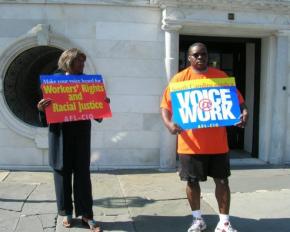Taking on South Carolina’s anti-union legacy
and look at the struggle of sanitation workers in Charleston, S.C., who are fighting to organize a union despite anti-union laws.
"WHY VISIT a historic plantation when you can visit a working one?"
So reads the opening line of an organizing pamphlet for Charleston, S.C., sanitation workers. On July 21, workers and allies gathered at City Hall to voice their objection to unfair treatment, dangerous work conditions, low pay and, above all, the right to representation.
As expected, the City Council refused to recognize the workers' right to democratically elect representatives to negotiate on their behalf--specifically, Charleston Local 1199 of the National Union of Hospital and Health Care Employees-1199B of the American Federation of State, County and Municipal Employees (AFSCME).
In fact, the decision to reject the workers' demands had already been made before the city council meeting. In a July 21 memorandum, Charleston Mayor Joseph Riley Jr. claimed that South Carolina's anti-union, "right-to-work" laws bar the city from recognizing or bargaining with unions. The workers got a similar response when they tried to organize back in 2003.

This ban on public-sector unions is common throughout the South. But Kerry Taylor, a close ally of the sanitation workers in Charleston and a labor and civil rights historian at The Citadel, argues that South Carolina legislation doesn't in fact bar such labor organization:
South Carolina law is silent on the issue of collective bargaining for public-sector workers. Some states have enabling legislation that allows public sector workers to organize, the states of Virginia and North Carolina have prohibitions from organizing, but South Carolina and other states are silent on the issue, meaning that it is up to the City Council or state agency whether they choose to negotiate with workers' associations or unions. The mayor and city council...are hiding behind a widespread assumption that the workers have no rights to bargain in South Carolina. No one wants to give voice to the assumption that they all hold...that sanitation workers are unworthy of democracy.
ALTHOUGH THE workers knew that they wouldn't receive justice in the July 21 City Council meeting, they used the opportunity to take their case to the public and build support. The workers, all African Americans, gathered in a room surrounded by large portraits of slave owners and heroes of the Confederacy--including South Carolina Sen. John C. Calhoun, former president Zachary Taylor and Confederate Gen. P.G.T. Beauregard. They told stories of management abuse, dangerous and unsanitary conditions, and injury after injury.
The workers' testimony was both heartbreaking and infuriating. As one worker noted, horses used for tourist carriage rides in Charleston are protected by a code of conduct eight pages long--but sanitation workers have no such safeguards. One worker spoke of how she was blamed for a grievous injury to her shoulders. Another described his two knee replacements and further surgery he has had to endure after years of working for the city. As another worker later commented, "The knees are the first to go."
The workers' organizing pamphlet further highlights the plight of injured workers:
Dozens of sanitation workers have been injured on the job as they labor under intense pressure to cover expanding routes with shrinking crews and outdated equipment.
A driver knocked unconscious by a tree branch that fell on her cab was rushed to MUSC [Medical University of South Carolina Hospital] and then hurried back to work a few days later by supervisors who ignored doctors' orders to keep her off the truck until she had healed.
Sick and injured workers are forced back to work before they are healthy.
And yet, as another worker told us, the horrors we heard in the city council meeting barely scratched the surface.
Solidarity was on full display at the meeting. Prominent figures from the long 1969 hospital strike led by 1199B came to voice their support. Two leaders of that fight, Mary Moultrie and Bill Saunders, drew parallels between that earlier struggle of African American workers in the city and the sanitation workers' battle today. Another speaker was Leonard Riley, a leading member of International Longshoremen's Association Local 1422, which led the successful defense campaign of the Charleston Five, workers placed under house arrest for more than a year after police attacked their picket line in January 2000.
One of the most captivating speakers at the meeting was 84-year-old James Campbell, a longtime civil rights activist. Campbell spoke movingly of the labor movement and reminisced about his great-grandmother, who told him about being liberated from slavery in the wake of the Union Army's advance into South Carolina's low country.
Despite the refusal of the City Council to meet their just demands, the Charleston sanitation workers will continue their fight. If they succeed, it will have an impact across the South.
According to the AFL-CIO, workers in right-to-work states make $5,000 less per year than workers in other states; workers' weekly wages are significantly less; right-to-work states have higher poverty and infant mortality rates, lower workers compensation benefits, and 51 percent more workplace deaths.
All this has kept the South as the poorest region in the country, with access to a pool of cheap, non-union labor for employers. And of course, the long history of racism and white supremacy--first directed at African Americans and now at increasing numbers of Latin American immigrants--helps employers to foster divisions among workers.
Change is possible, however. The recent union organizing victory at the Smithfield pork processing plant in Tar Heel, N.C., after years of struggle against an aggressively anti-union employer, proves that even in difficult conditions, unions can be organized in the South. The Charleston sanitation workers' fight is an important step in that effort.


